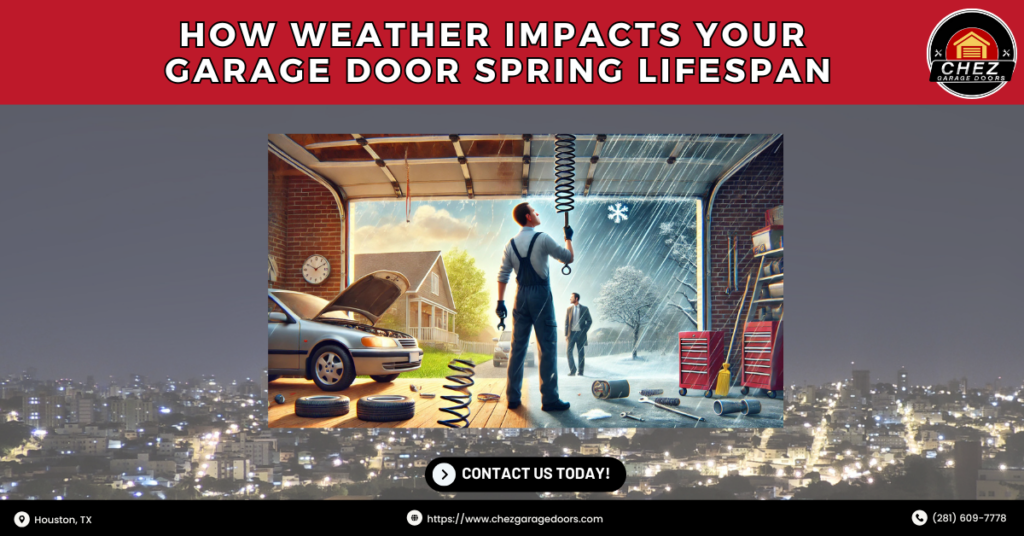Discover how Houston’s weather affects your garage door spring lifespan and get expert maintenance tips from Chez Garage Doors, serving Houston, TX.

Did you know that extreme temperatures can shorten your garage door spring’s lifespan by up to 30%? Houston’s climate presents unique challenges for garage doors, and without proper care, your springs could wear out faster than expected. Whether you’re dealing with sweltering summers, high humidity, or sudden cold snaps, understanding how these conditions affect your garage door can help you avoid costly repairs and ensure smooth operation year-round.
The Hidden Impact of Houston’s Climate on Garage Door Springs
Houston, TX, experiences a mix of hot and humid weather with occasional winter chills. These varying conditions can impact your garage door springs by causing them to expand, contract, and corrode, leading to premature wear, tension loss, and unexpected failures. Staying proactive with regular maintenance can extend their lifespan and prevent inconvenient breakdowns.
How Heat Affects Your Garage Door Springs
In the peak of summer, when temperatures soar above 100°F, the metal components of your garage door, including the springs, expand. This increased tension puts added stress on the springs, making them more likely to snap or lose their elasticity over time. If your garage door is making unusual noises or struggling to open, it could be a sign that the heat is taking its toll.
Preventive Maintenance During Hot Weather
Follow these tips to keep your springs in top shape during Houston’s intense summer months:
- Apply High-Quality Lubricant: Regular lubrication helps minimize friction and prevent overheating that accelerates wear and tear.
- Inspect for Rust or Corrosion: The combination of heat and humidity can lead to corrosion, weakening the springs.
- Monitor Spring Stretching: Over time, springs may elongate due to continuous expansion—have them inspected and replaced if necessary.
The Chilling Effect of Cold Weather on Garage Door Springs
Although Houston winters are generally mild, sudden temperature drops can cause metal springs to contract and become brittle. This loss of flexibility makes them prone to snapping under tension, potentially leaving your garage door stuck and requiring emergency repairs.
Winter Garage Door Maintenance Tips
To protect your garage door during colder months, follow these preventive measures:
- Use Cold-Weather Lubricants: Specially formulated lubricants help maintain flexibility in freezing temperatures.
- Limit Frequent Use: Opening and closing the door excessively in cold weather can strain already contracted springs.
- Schedule Pre-Winter Inspections: Professional inspections can catch potential issues before they escalate during winter.
Humidity: A Silent Spring Killer
Houston’s high humidity levels can be just as damaging as extreme temperatures. Moisture buildup can lead to rust and corrosion, which weakens the metal and shortens the lifespan of your springs. If your garage lacks proper ventilation, humidity can silently degrade your entire garage door system.
Combating Humidity Damage
Protect your garage door springs from moisture-related damage with these simple steps:
- Invest in a Dehumidifier: This helps regulate moisture levels inside your garage.
- Apply Rust-Resistant Coatings: Protect your springs by using anti-rust treatments.
- Schedule Professional Check-Ups: Routine inspections from experts in garage door spring repair can catch corrosion early.
How to Extend the Lifespan of Your Garage Door Springs
Want to avoid frequent repairs? Here are some tips to make your garage door springs last longer:
- Routine Inspections: Schedule annual check-ups to detect minor issues before they become major problems.
- Invest in High-Quality Springs: Choose premium-grade torsion or extension springs that are built for Houston’s climate.
- DIY Checks: Stay alert to unusual noises, slow door movement, or visible wear in the springs.
- Keep Your Garage Door Balanced: An unbalanced door adds unnecessary strain to the springs, causing them to wear out faster.
FAQ: Your Questions Answered
Q: How often should I replace my garage door springs?
A: Typically, garage door springs last between 7-12 years, but Houston’s climate may shorten their lifespan due to heat and humidity.
Q: Can I replace garage door springs myself?
A: No, garage door spring repair should be left to professionals due to the high tension involved, which poses safety risks.
Q: What are the signs that my garage door springs are failing?
A: Look for symptoms such as slow door movement, loud creaking sounds, or visible gaps in the springs.
Is Your Garage Door Ready for Houston’s Weather?
Don’t wait until your garage door springs break! Whether you need garage door repair in Houston, TX, garage door installation, or emergency garage door repair, Chez Garage Doors has got you covered.
We proudly serve areas near:
Conclusion
Houston’s unpredictable climate can put your garage door springs through a lot, but with the right maintenance and expert assistance, you can ensure they last for years to come. Whether it’s extreme heat, humidity, or a sudden cold snap, proactive care is the key to avoiding expensive repairs.
At Chez Garage Doors, we specialize in garage door replacement, garage door opener repair, and garage door spring repair in Houston, TX. Our experienced team provides top-notch residential and commercial garage door repair services customized for Houston’s weather conditions.
If your garage door is showing signs of wear, don’t wait until it’s too late. Contact Chez Garage Doors today for professional service and reliable solutions. We’re here to help you keep your garage door functioning smoothly no matter what the weather brings!
